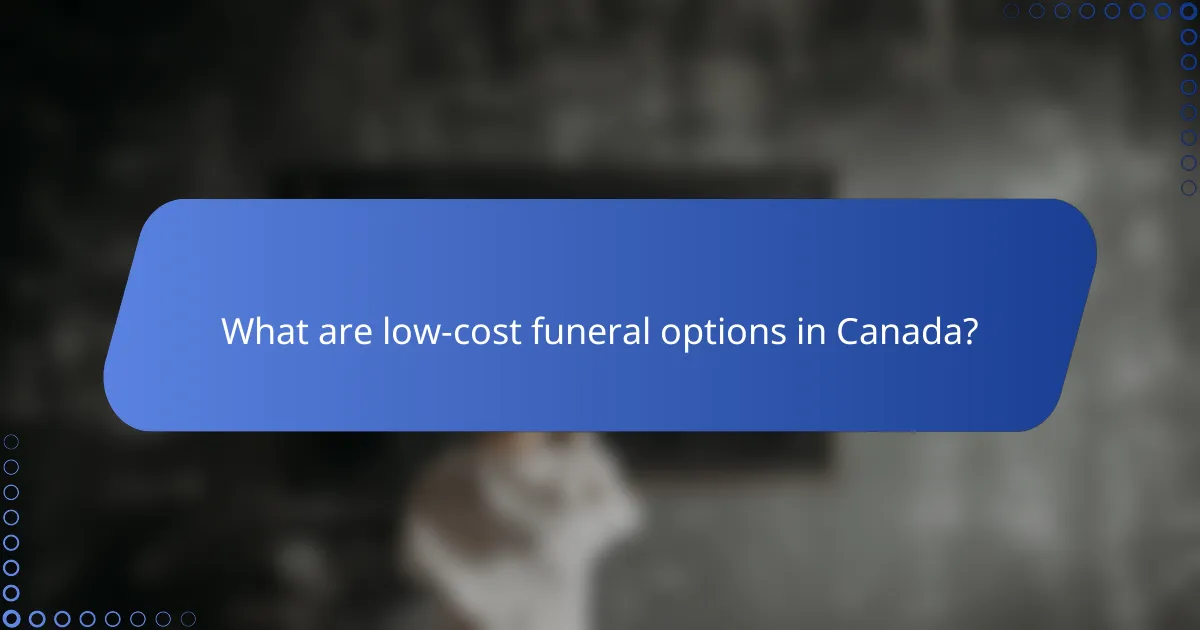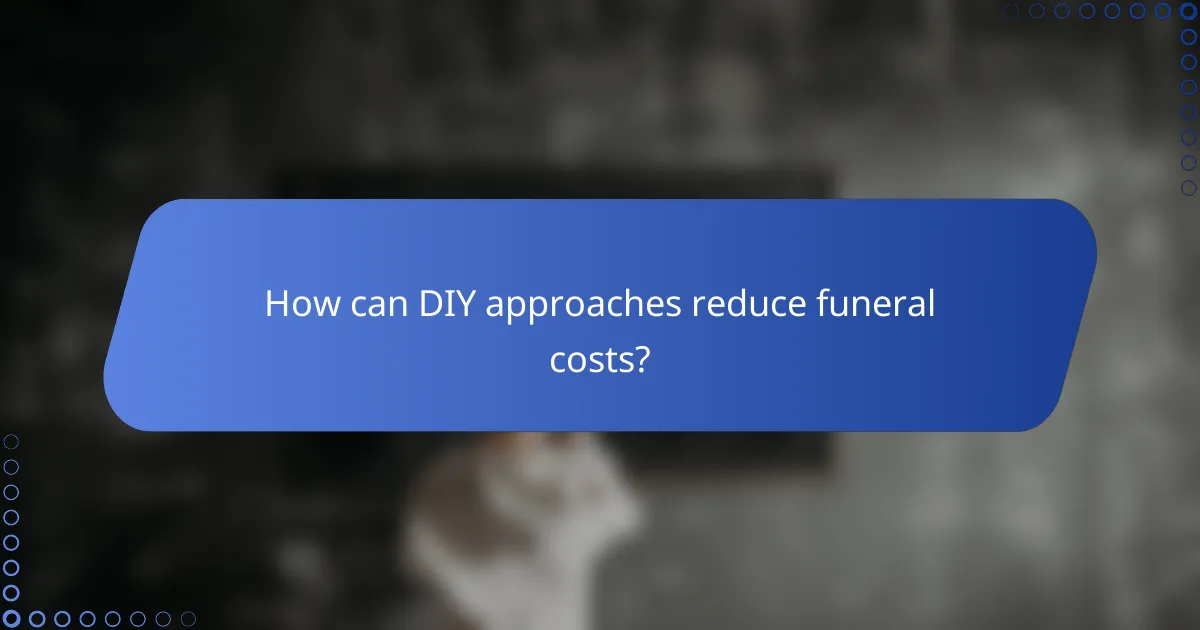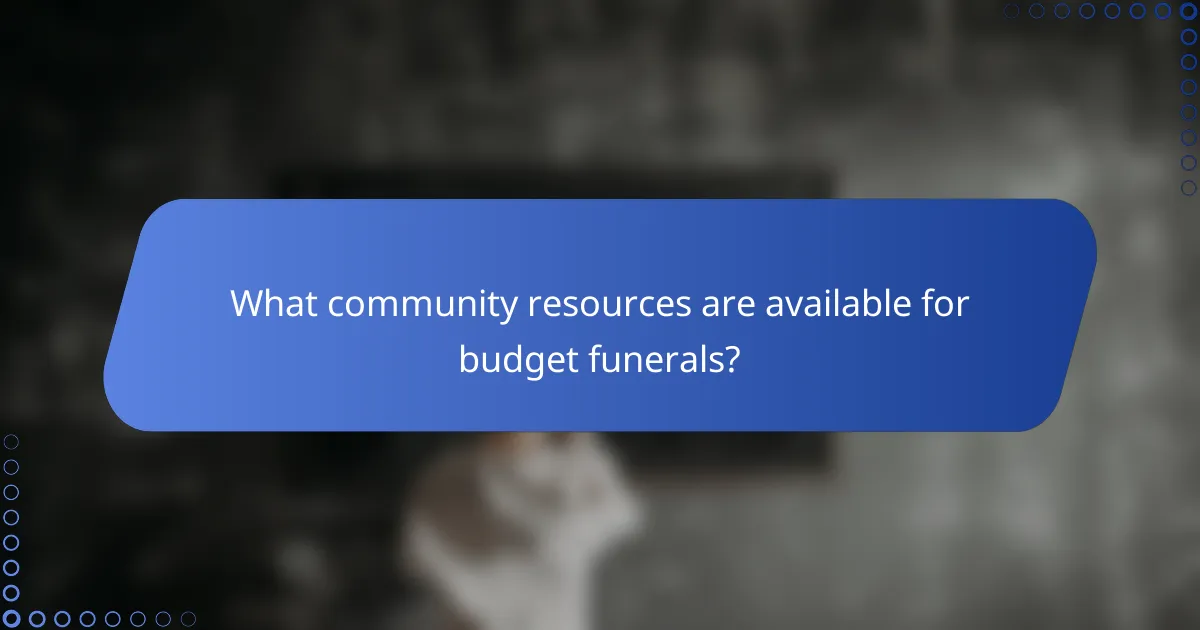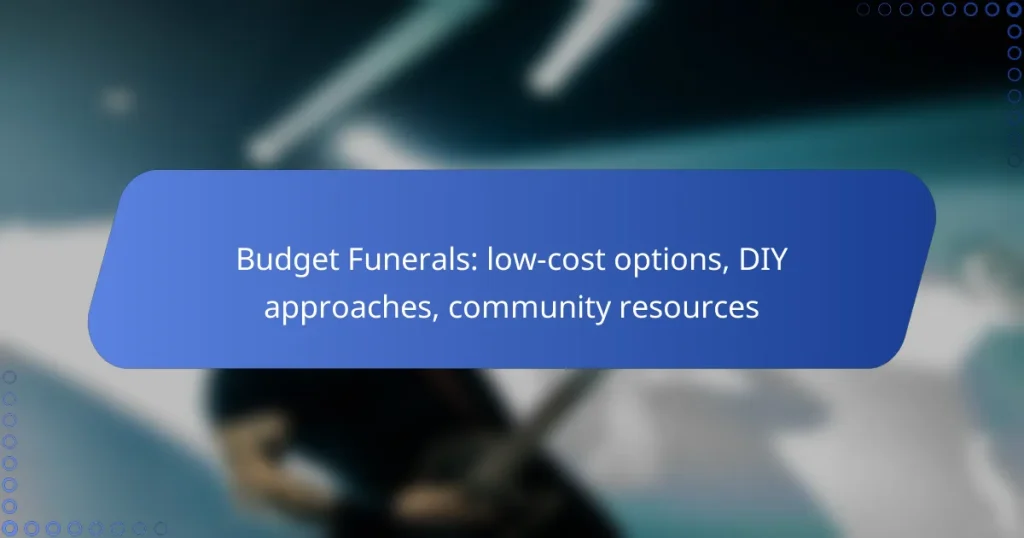Budget funerals offer families a way to honor their loved ones without incurring overwhelming expenses. By exploring low-cost options, DIY approaches, and community resources, individuals can create meaningful farewells that reflect personal values while remaining financially manageable. These alternatives ensure that the focus remains on celebrating life rather than the financial burden of traditional funeral services.

What are low-cost funeral options in Canada?
Low-cost funeral options in Canada include various services that help families manage expenses during a difficult time. These options often focus on simplicity and affordability, allowing for meaningful farewells without the financial burden of traditional funerals.
Cremation services
Cremation services are typically more affordable than traditional burial options. In Canada, the average cost for a basic cremation can range from CAD 1,000 to CAD 3,000, depending on the provider and location. Many funeral homes offer direct cremation, which is a straightforward process without a formal service.
When considering cremation, families should inquire about additional fees for services such as transportation, urn selection, and memorialization options. Comparing prices from multiple providers can help ensure you find the best deal.
Direct burial services
Direct burial services involve placing the deceased in a grave without a formal viewing or service beforehand. This option usually costs between CAD 1,500 and CAD 3,500, making it a budget-friendly choice. Families can opt for a simple casket and a graveside service if desired.
It’s important to check with local cemeteries about their requirements and any additional costs that may apply. Some cemeteries may have specific rules regarding the type of casket or burial container allowed.
Green burial options
Green burial options focus on environmentally friendly practices, using biodegradable materials and natural settings. This approach often costs less than traditional burials, with prices typically ranging from CAD 1,500 to CAD 4,000. Green burial sites may not require a vault, which can significantly reduce costs.
Families interested in green burials should research local cemeteries that offer these services and understand any regulations regarding natural burials in their area. This option not only saves money but also contributes to environmental conservation.
Memorial services
Memorial services can be a cost-effective way to honor a loved one without the expenses associated with a full funeral. These services can be held in various locations, such as homes, parks, or community centers, and typically range from CAD 100 to CAD 1,500, depending on the venue and arrangements.
Consider organizing a potluck-style gathering where friends and family can share memories, which can further reduce costs. Personal touches like homemade decorations or shared stories can make the service meaningful without significant financial investment.
Pre-planning discounts
Pre-planning discounts allow individuals to arrange and pay for their funeral services in advance, often at a lower rate. Many funeral homes in Canada offer discounts for pre-planning, which can save families money and alleviate financial stress later on.
When considering pre-planning, review the terms carefully, including any potential price guarantees and refund policies. This proactive approach can ensure that your wishes are honored while keeping costs manageable for your loved ones.

How can DIY approaches reduce funeral costs?
DIY approaches can significantly lower funeral expenses by allowing families to take control of various aspects of the process. By creating homemade elements and personalizing ceremonies, families can save money while honoring their loved ones in meaningful ways.
Homemade memorials
Creating homemade memorials is a heartfelt way to commemorate a loved one while keeping costs down. Families can craft items like photo collages, memory jars, or hand-painted stones, which can serve as personal tributes. These memorials can often be made with materials already available at home or purchased at low-cost local stores.
Consider involving friends and family in the creation process to make it a collaborative effort. This not only reduces costs but also strengthens community bonds during a difficult time.
DIY caskets
Building a DIY casket can be a cost-effective alternative to purchasing a traditional one, which can be quite expensive. Many families opt to construct a simple wooden casket using readily available materials, often spending only a few hundred dollars. Local regulations typically allow for homemade caskets, but it’s essential to check with the funeral home or local authorities to ensure compliance.
When considering a DIY casket, focus on basic designs that prioritize functionality and comfort. Online resources and tutorials can provide guidance on construction techniques and materials needed.
Personalized ceremonies
Personalizing ceremonies can create a unique and memorable experience while minimizing costs. Families can choose to hold services at home, in a park, or at a community center, avoiding high venue fees. Incorporating personal elements such as favorite songs, readings, or rituals can make the ceremony more meaningful without incurring additional expenses.
Engaging friends and family members to contribute to the ceremony, whether through speeches or performances, can enhance the experience and reduce reliance on paid services. This approach fosters a sense of community and shared remembrance, making the event special without breaking the bank.

What community resources are available for budget funerals?
Community resources for budget funerals can significantly reduce costs and provide support during a difficult time. Options include non-profit funeral homes, government assistance programs, and local charities that offer financial aid or services.
Non-profit funeral homes
Non-profit funeral homes operate with the primary goal of serving the community rather than making a profit. They often provide lower-cost services compared to traditional funeral homes, making them a viable option for families on a budget. It’s advisable to compare prices and services offered by different non-profits to find the best fit.
Many non-profit funeral homes offer basic packages that include essential services such as transportation, preparation, and a simple casket. Some may also provide additional support, such as grief counseling or assistance with memorial services.
Government assistance programs
Various government assistance programs can help cover funeral costs for eligible individuals. These programs may include Social Security death benefits or state-funded burial assistance, which can provide financial relief to families facing unexpected expenses.
To access these benefits, families typically need to apply through local government offices or social services. It’s important to gather necessary documentation, such as the deceased’s Social Security number and proof of income, to streamline the application process.
Local charities and organizations
Many local charities and organizations offer financial assistance or services for funerals, especially for families in need. These resources can range from churches and community foundations to specific non-profits focused on end-of-life care.
Contacting local organizations can yield valuable information about available resources. Some may provide direct financial aid, while others might offer services like memorial planning or help with transportation. Always inquire about eligibility requirements and application processes to ensure access to these resources.

What are the criteria for choosing a budget funeral service?
Choosing a budget funeral service involves evaluating several key criteria, including price, services offered, and customer feedback. Understanding these factors can help you make an informed decision that respects both your financial constraints and the wishes of your loved one.
Comparing prices
When comparing prices for budget funeral services, it’s essential to obtain quotes from multiple providers. Costs can vary significantly, often ranging from a few hundred to several thousand dollars, depending on the services included. Look for transparency in pricing and inquire about any additional fees that may not be included in the initial quote.
Consider using online comparison tools or local directories to streamline your search. Many funeral homes are required to provide a General Price List (GPL), which outlines their services and associated costs, making it easier to compare options.
Understanding services offered
Ask potential providers about their service packages and what is included. Some may offer basic services, while others might have customizable options that allow you to add specific elements, such as transportation or memorial items, at an additional cost.
Evaluating customer reviews
Customer reviews provide valuable insights into the quality of service offered by budget funeral providers. Look for feedback on aspects such as compassion, professionalism, and overall satisfaction. Websites like Yelp or Google Reviews can be helpful in assessing the reputation of a funeral home.
Pay attention to both positive and negative reviews to get a balanced perspective. Additionally, consider asking friends or family for recommendations based on their experiences, as personal referrals can often lead to trustworthy options.

How to plan a budget-friendly funeral?
Planning a budget-friendly funeral involves understanding costs, prioritizing essential services, and utilizing community resources. By setting a clear budget and making informed choices, families can honor their loved ones without incurring excessive expenses.
Creating a budget
Start by determining how much you can afford to spend on the funeral. Consider all potential expenses, including transportation, casket or urn, venue, and any additional services. A typical budget for a basic funeral in the U.S. might range from $5,000 to $10,000, but costs can vary significantly based on location and choices.
List all expected costs and categorize them into essential and optional expenses. This will help you identify areas where you can cut back. For example, opting for a simple cremation instead of a traditional burial can save a substantial amount.
Choosing essential services
Focus on essential services that align with your budget. Basic services often include transportation of the deceased, obtaining necessary permits, and preparing the body. Many funeral homes offer package deals that can reduce costs.
Consider alternatives such as direct cremation or a memorial service without a viewing. These options can significantly lower expenses while still providing a meaningful way to celebrate life.
Involving family and friends
Engaging family and friends in the planning process can help distribute responsibilities and reduce costs. Assign tasks such as organizing the service or creating memorial materials to those willing to help.
Additionally, consider pooling resources with family members to cover expenses. This collaborative approach can ease the financial burden and create a supportive environment during a difficult time.


